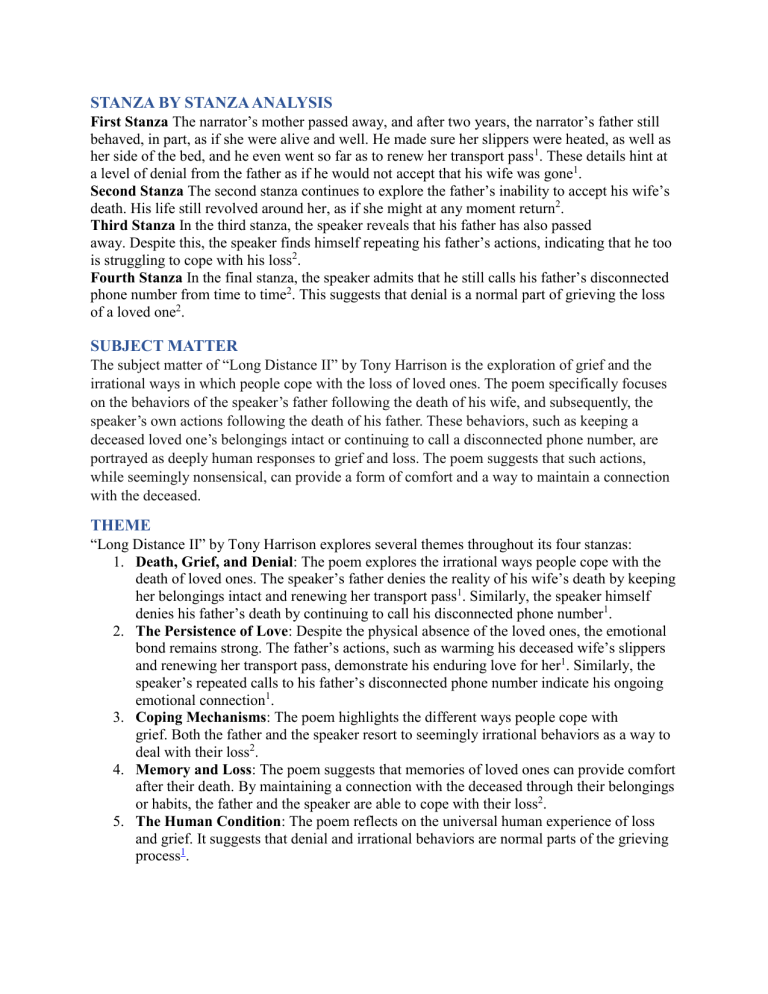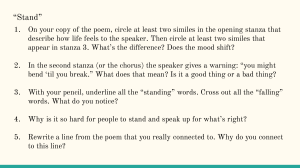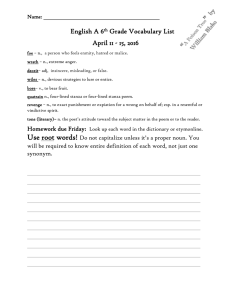
STANZA BY STANZA ANALYSIS First Stanza The narrator’s mother passed away, and after two years, the narrator’s father still behaved, in part, as if she were alive and well. He made sure her slippers were heated, as well as her side of the bed, and he even went so far as to renew her transport pass1. These details hint at a level of denial from the father as if he would not accept that his wife was gone1. Second Stanza The second stanza continues to explore the father’s inability to accept his wife’s death. His life still revolved around her, as if she might at any moment return2. Third Stanza In the third stanza, the speaker reveals that his father has also passed away. Despite this, the speaker finds himself repeating his father’s actions, indicating that he too is struggling to cope with his loss2. Fourth Stanza In the final stanza, the speaker admits that he still calls his father’s disconnected phone number from time to time2. This suggests that denial is a normal part of grieving the loss of a loved one2. SUBJECT MATTER The subject matter of “Long Distance II” by Tony Harrison is the exploration of grief and the irrational ways in which people cope with the loss of loved ones. The poem specifically focuses on the behaviors of the speaker’s father following the death of his wife, and subsequently, the speaker’s own actions following the death of his father. These behaviors, such as keeping a deceased loved one’s belongings intact or continuing to call a disconnected phone number, are portrayed as deeply human responses to grief and loss. The poem suggests that such actions, while seemingly nonsensical, can provide a form of comfort and a way to maintain a connection with the deceased. THEME “Long Distance II” by Tony Harrison explores several themes throughout its four stanzas: 1. Death, Grief, and Denial: The poem explores the irrational ways people cope with the death of loved ones. The speaker’s father denies the reality of his wife’s death by keeping her belongings intact and renewing her transport pass1. Similarly, the speaker himself denies his father’s death by continuing to call his disconnected phone number1. 2. The Persistence of Love: Despite the physical absence of the loved ones, the emotional bond remains strong. The father’s actions, such as warming his deceased wife’s slippers and renewing her transport pass, demonstrate his enduring love for her1. Similarly, the speaker’s repeated calls to his father’s disconnected phone number indicate his ongoing emotional connection1. 3. Coping Mechanisms: The poem highlights the different ways people cope with grief. Both the father and the speaker resort to seemingly irrational behaviors as a way to deal with their loss2. 4. Memory and Loss: The poem suggests that memories of loved ones can provide comfort after their death. By maintaining a connection with the deceased through their belongings or habits, the father and the speaker are able to cope with their loss2. 5. The Human Condition: The poem reflects on the universal human experience of loss and grief. It suggests that denial and irrational behaviors are normal parts of the grieving process1. STRUCTURE “Long Distance II” by Tony Harrison has the following structure and uses several poetic and literary devices: Structure: The poem consists of four stanzas, each containing six lines. It is written in free verse, with no strict meter. The poem follows a mixed rhyme scheme of ABAB for the first three stanzas and ABBA in the final stanza. Poetic Devices: Enjambment: This is where a sentence, phrase, or thought does not finish at the line break but continues on to the next line or lines. This device is used in the poem to give a sense of continuous, informal speech. Caesura: This refers to a pause or break within a line of poetry, usually placed somewhere toward the middle of a line. Anaphora: This is the repetition of a word or phrase at the beginning of successive lines, clauses, or sentences. This device is used in the poem to emphasize certain points. Alliteration: This is the repetition of the same consonant sounds at the beginning of words that are in close proximity. Literary Devices: Imagery: The poem uses vivid and descriptive language to create pictures or images in the reader’s mind. For example, the father keeping the mother’s slippers warm and renewing her transport pass creates a strong image of his denial and grief. Symbolism: Certain objects in the poem, such as the heated slippers and the renewed transport pass, symbolize the father’s inability to accept his wife’s death. Repetition: The poem uses repetition to emphasize the ongoing nature of grief, as seen in the speaker’s repeated calls to his father’s disconnected phone number. DICTION The diction of “Long Distance II” by Tony Harrison is simple and straightforward, which makes the poem accessible and easy to understand. The language used is informal and conversational, giving the poem a sense of intimacy and immediacy12. The poet uses everyday language to describe the actions of the father and the speaker, which underscores the universality of their experiences of grief3. Despite the simplicity of the language, the poem is rich in meaning and emotion, demonstrating Harrison’s skill in conveying complex feelings and ideas through simple words13. The use of enjambment throughout the poem gives a sense of continuous, informal speech2. This choice of diction helps to create a powerful and moving exploration of grief and loss13. TONE & MOOD The tone of “Long Distance II” by Tony Harrison is mostly matter-of-fact with an undertone of frustration and surprise1. The speaker initially seems incredulous at his father’s inability to accept his mother’s death2. This incredulity gives way to understanding and empathy as the speaker finds himself repeating his father’s actions2. As for the mood, the poem creates a somber and reflective atmosphere. It explores the pain and power of grief, evoking feelings of sadness, denial, and ultimately, acceptance2. The reader is drawn into the deeply personal and universal experience of loss, making the mood of the poem both intimate and relatable3.




